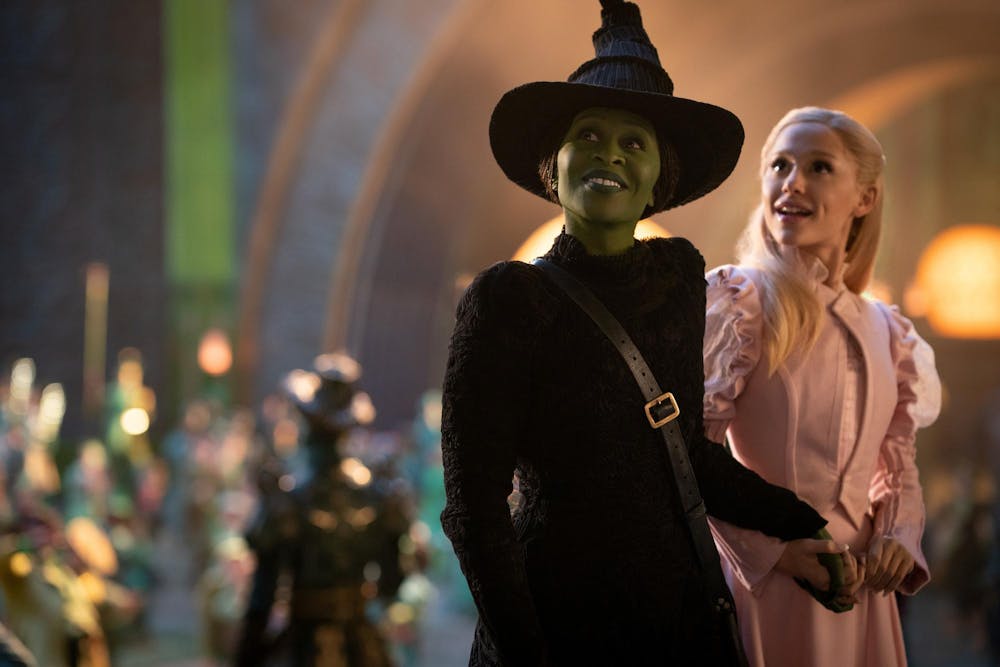Editor's note: All opinions, columns and letters reflect the views of the individual writer and not necessarily those of the IDS or its staffers.
First, a kid-adjacent-to-theatre confession: despite years of participating in theatrical productions in some capacity or another, I knew next to nothing about “Wicked” prior to seeing the movie adaptation this Thanksgiving break. I had heard of the musical, certainly, and I knew it was somehow related to the classic “Wizard of Oz” movie, but that was the extent of my knowledge. Yes, I know, a travesty, but I am not here to submit myself to the judgment of my peers (however deserved that judgement may be).
I will, however, never miss an opportunity to play dress-up. So, in an effort to keep with the theme, I donned my ruby red slippers from a freshman year Halloween costume and a dark green sweater and went with a few friends to see what all the hubbub was about. Was the movie worth the hype? Why are Ariana Grande and Cynthia Erivo always crying during their interviews? And what on earth does it even mean to “hold space for the lyrics of Defying Gravity”?
At first, the movie seems to be a fun, frenemies to besties “girl-power” story about witches, wizards and talking animals — the tale of two very different girls navigating college and roommate struggles, juggling boy problems and academics. However, as the movie progressed, I started to notice deeper themes and perhaps some political similarities between the Land of Oz and our “Land of the Free.”
Readers of Gregory Maguire’s original 1995 book probably felt the same way. Maguire’s book reimagines Oz as a society riddled with oppression and injustice where the “wonderful” wizard himself is an Adolf Hitler-esque dictator. Themes of systemic discrimination and oppression permeate the story, with the famous yellow-brick road being built by munchkin slave labor and the plight of the animals which many have equated with the Holocaust. To further make his point, the names “Wicked” and “Hitler” both have two syllables and six letters with two of them in common. When asked in an interview if readers could infer a connection between the title of his book and the world’s most reviled villain of the past century, Maguire made clear that “that was no accident”.
The musical adaptation, though slightly softened, retained its political edge. Written during the transitions between the presidencies of Bill Clinton and George W. Bush, it weaves sharp commentary on power and propaganda. The Wizard’s character and songs, such as when he sings “Is one a crusader or ruthless invader?” reflects critiques of both administrations. The “crusader” lyric is no accident; It's a direct reference to Bush-era Iraq War rhetoric, such as when Bush referred to the “crusades” to describe his war in Iraq. Even Galinda’s description of Dorothy’s house crushing the Wicked Witch of the East as a “regime change”, another Iraq war phrase, is perhaps one of the Musical’s most deliberate political double entendres.
As I watched the movie, what stood out the most to me was the stark contrast in how Galinda, a white woman of great privilege and upper-class background, and Elphaba, who has spent her entire life as someone marginalized for the color of her skin, respond to the Wizard and Madame Morrible’s attempts to silence the talking animals. Their reactions to this injustice, and to the realization that their government is deeply corrupt and broken, highlight their vastly different perspectives shaped by their backgrounds. Galinda immediately tries to reason and negotiate with the oppressors, “groveling in submission to feed [her] own ambition”, as Elphaba puts it. Galinda makes no attempt to change the broken system, just to share in its power.
Elphaba, on the other hand, recognizes the system for what it is —unfixable. She knows there is no way for her to participate in this broken government without aiding its oppression, and so, she leaves. She is unwilling to work with Madame Morrible or the Wizard, and so they label her a terrorist, turning everyone she knows against her.
“Wicked,” to put it simply, has always been about how people respond when faced with blatant injustice. It compels its audience to critically examine who society labels "wicked" and why. It challenges us to confront the very question Galinda asks at the story's beginning: "How does someone become wicked?" As she ponders this question, she reflects, “Are people really born wicked, or is wickedness thrust upon them?" By exploring this complex moral question, “Wicked” reveals that the line between good and evil is often shaped by perspective and circumstance.
Furthermore, it’s a political declaration of how obvious the signs are of a dictator’s rise to power. Early in the story, when Dr. Dillamond (a literal scapegoat) explains to Elphaba what is happening to the animals, she asks “could this really happen?” to which he responds, “It already is.” The reality of the situation, for Oz and America, is that the signs are always there from the beginning.
“Wicked” urges us to recognize the recurring patterns in both the world and American politics. These cycles, all too familiar, often feature weak and manipulative leaders who exploit the fears of a struggling society by scapegoating marginalized groups for their own gain, aiming for total control. As the Wizard chillingly puts it, “the best way to bring folks together is to give them a really good enemy” Those who challenge such systems face harsh consequences, reinforcing the dangers of unchecked power. The signs of these cycles are always there from the start — for those willing to look behind the curtain.
Ainsley Foster (she/her) is a junior studying Elementary Education.






